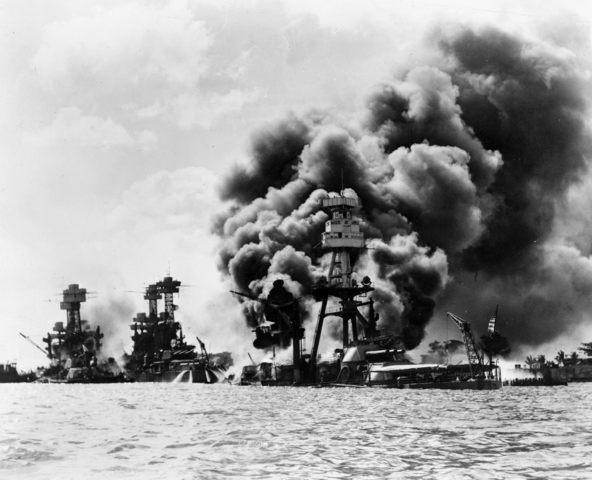The Contested US Intelligence Community: Why Limiting its Role Would be a Blunder

U.S. Navy battleships at Pearl Harbor on 7 December 1941 | By USN [Public domain], via Wikimedia Commons
![U.S. Navy battleships at Pearl Harbor on 7 December 1941 | By USN [Public domain], via Wikimedia Commons](https://jpinyu.com/wp-content/uploads/2016/12/592px-Pearl_harbour.png)
Following 9/11, WikiLeaks and Edward Snowden’s divulgence of stolen secrets—which risked American lives and damaged national security interests—critics believe the US intelligence community has grown too large and inefficient. However, proposed limits on the role of the intelligence community are neither feasible nor desirable, as they would increase threats to the US and its people.
The purpose of the 17 intelligence agencies remains the same: assurance and conduct of national security. But the threats have not. On September 7, 2016, James R. Clapper, Director of National Intelligence, stated that “we’re facing the most complex and diverse array of global threats that I’ve seen in my 53 years or so in the intelligence business.” These complex and diverse threats require more information and analysis to effectively inform and warn policymakers.
Prior to WWII, US intelligence focused on state actors—restricted to military operations and communications support—and not necessarily embraced by policymakers. Henry Stimson, President Herbert Hoover’s Secretary of State, justified closing the cryptanalytic office in 1929 and limiting the role of intelligence by famously saying, “Gentlemen do not read other gentlemen’s mail.”
In 1941, the FBI focused on domestic intelligence, espionage and sabotage, and refused to work with the CIA, which placed its emphasis on foreign threats. The fatal surprise attack on Pearl Harbor, however, demonstrated the need for a more coordinated and effective intelligence community.
Intelligence agencies have made progress in exchanging information and cooperating on issues that threaten US national security. In response to 9/11, the Intelligence Reform and Terrorism Prevention Act of 2004 established the Office of the Director of National Intelligence. Under this director, all 17 agencies work together to produce National Intelligence Estimates: thorough analyses for policymakers. Narrowing the role of intelligence would likely reverse these collaborative gains and restrict domestic and foreign intelligence’s ability to accurately identify threats and analyze information.
Increasing threats from non-state actors and transnational issues—including cyber threats, terrorism, narcotics trafficking and climate change—necessitate greater scrutiny from the intelligence community today. Because the connections between these transnational issues require a shift in focus from the intelligence community, implementing further limitations could be disastrous.
The explosion on September 17, 2016 of a lethal device in the Chelsea neighborhood of New York City demonstrated that agencies can no longer draw strict lines between domestic and foreign matters. Though the suspect Ahmad Khan Rahami lived in New Jersey and was an American citizen, his motivations and intentions may have been derived from extremist Islamic ideology in the Middle East and Central Asia.
Domestic and foreign issues merged, requiring foreign intelligence (CIA) and domestic law enforcement (FBI) cooperation. This collaboration made it possible to arrest Rahami within four hours of the release of an emergency alert after uncovering his travels to Afghanistan and Quetta, Pakistan, a stronghold of the Taliban.
There are numerous arguments in favor of limiting the intelligence community’s role. Edward Snowden was one of the community’s 1.4 million top-secret security-cleared members, and one of the roughly 0.5 percent of those involved in “top-secrets” of the state. Yet, his disclosures reveal that even given this restricted access, security breaches are always possible. Considering the intelligence community’s persistent growth, critics are also concerned about its ability to maintain secrecy given the cases of Aldrich Ames and Philip Hanssen.
Perhaps the number of top-security clearances should be limited, but not the function of intelligence itself. By dividing security clearance into more levels than the current top secret, confidential secret and clearance secret, access to the most sensitive materials would be limited without reducing the workforce necessary for successful intelligence work.
That being said, the small number of Snowden-esque cases of treason suggests that the recurrent clearance checks that personnel undergo are sufficient in verifying agents’ integrity and loyalty. Using concerns over leaks to justify reducing the number of security clearances further would dangerously diminish human resources and increase risks to the United States.
Limiting the intelligence community in 2016 would be comparable to Stimson discontinuing the cryptanalytic office in 1929. What followed this decision? The attack on Pearl Harbor and a Second World War. An increase in transnational issues, an abundance of information in a digital age and ongoing lone-wolf terrorist attacks expose the importance of intelligence work. Unfortunately, measurements of the success of intelligence are chiefly intangible, while mishandlings and failures dominate news coverage.
Today, gentlemen—and ladies—do read each other’s mail, and must continue to do so to identify threats.
Doreen Horschig is pursuing her master’s degree in International Relations at New York University as a DAAD Fellow (German Academic Exchange Service). Her areas of research include International Security, Nuclear Security, and U.S. Intelligence which she has published her work on in peer-reviewed journals. Previously, Doreen was a Research Assistant for the Organization for International Cooperation and for Dr. James H. Nolt. She has also worked for Human Rights Watch in NY and the German Federal Parliament (Deutscher Bundestag) in Berlin. She graduated summa cum laude from Manhattan College with a B.A. in International Studies.




